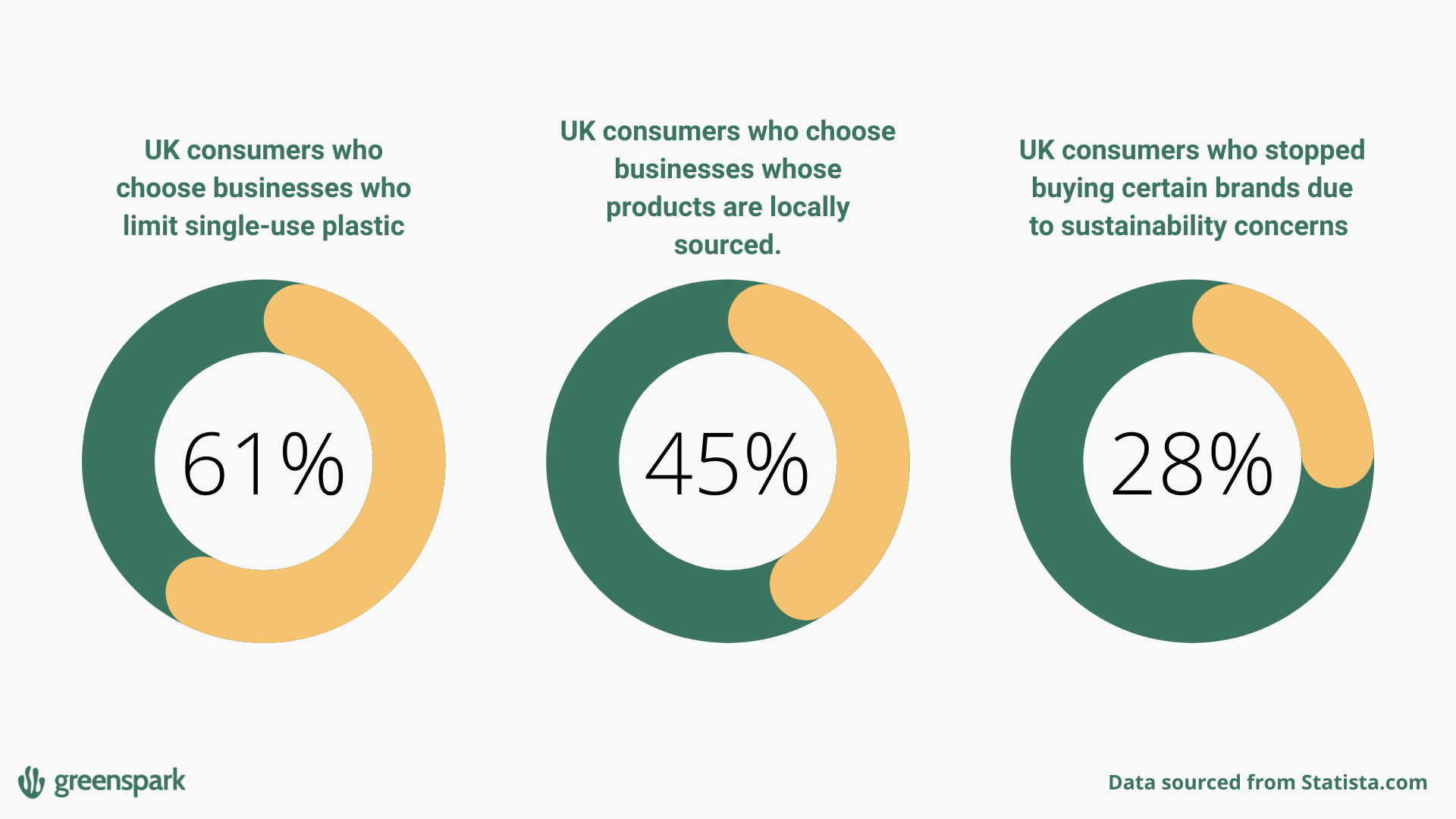As businesses become more conscious of their environmental impact, they are increasingly taking steps to become more sustainable. From reducing waste and investing in renewable energy sources to conserving water resources and supporting local communities, these are just some of the ways how are businesses becoming more sustainable.
This blog post will explore the different actions that companies can take to help create a greener future for everyone. Sustainable business practices are essential for both our planet’s health as well as ensuring economic success over time – something all organizations should be striving towards!
So how are businesses becoming more sustainable? Let’s find out.
Table of Contents
Why Should Your Business Become More Eco-Friendly?
The world is changing, and businesses need to change with it. By becoming more eco-friendly, you can make a positive impact on the environment while also improving your business’s bottom line.
Here are some of the reasons why your business should strive to become more sustainable.
- Consumers Prefer Eco-Friendly Businesses – More and more consumers are looking for companies that care about sustainability and environmental protection. 90% of consumers say they would switch brands if it meant supporting an eco-friendly company. Showing customers that you care about the environment will help build trust in your brand and increase customer loyalty.
- Sustainability Saves Money – Implementing green practices can save money in the long run by reducing energy costs, waste disposal fees, and water bills. For example, switching to LED lighting or installing solar panels can significantly reduce electricity costs over time as well as reduce emissions from burning fossil fuels for power generation. Additionally, recycling materials like paper or cardboard instead of throwing them away can save on landfill dumping charges or incineration costs.
- Positive Brand Image – Being seen as an environmentally conscious company helps create a positive image for your brand which leads to increased customer engagement and higher sales figures.
- Regulatory Compliance – Staying up-to-date with local regulations regarding environmental issues such as air pollution control measures or hazardous waste management protocols may be required depending on where you operate geographically. Violation of these rules could result in hefty fines so taking proactive steps now could help avoid costly penalties later down the road.
So how are businesses becoming more sustainable?
Investing in Renewable Energy Sources
Businesses are increasingly embracing sustainability by investing in renewable energy sources. Solar power is one of the most popular forms of renewable energy, and many businesses are taking advantage of it. By installing solar panels on their roofs or other areas exposed to sunlight, companies can generate electricity from the sun’s rays and reduce their reliance on traditional fossil fuels.
Additionally, businesses can benefit from tax credits and other incentives for using solar power.
Wind power is another form of renewable energy that businesses are turning to as a way to become more sustainable. Wind turbines capture kinetic energy from wind currents and convert it into usable electricity without releasing any emissions into the atmosphere. Companies can install wind turbines either on-site or off-site depending on local regulations, making this an attractive option for those looking to reduce their carbon footprint while maintaining reliable access to electricity.
Businesses have been exploring geothermal energy as a way to increase sustainability efforts in recent years. Geothermal systems use heat stored beneath the earth’s surface to produce steam, which then powers generators and produces electricity. This allows companies to benefit from substantial savings due to lower operating costs and reduced environmental impact.
Conserving Water Resources
Conserving water resources is an important part of embracing sustainability in businesses. Installing low-flow fixtures and appliances can help reduce the amount of water used, while also saving money on utility bills. Low-flow showerheads, toilets, and faucets all use significantly less water than traditional fixtures.
Businesses should also consider collecting rainwater for irrigation, flushing toilets, or washing cars. Rain barrels can be installed around a building’s perimeter to collect runoff from rooftops during storms which can then be used instead of potable water sources.
Greywater systems are another great way for businesses to conserve water resources by reusing wastewater from showers, sinks, and washing machines. Greywater systems filter out contaminants so that it is safe enough to reuse for non-potable purposes such as toilet flushing or landscape irrigation. This type of system has been proven effective at reducing overall water usage in buildings while still providing adequate sanitation services.
Facility managers should also fix leaks promptly and choose drought-tolerant plants in landscaping projects whenever possible.
Additionally, educating employees about the importance of conserving water resources is essential if companies want to make sure everyone understands how it benefits both the environment and business operations.
 (Source)
(Source)
Supporting Local Communities and Economies
Supporting local communities is one of the meaningful ways how are businesses becoming more sustainable.
Purchasing local goods and services is one of the most effective ways for companies to give back to their communities. This practice helps create jobs, supports small business owners, reduces transportation costs associated with shipping products from farther away locations, and promotes sustainability by reducing carbon emissions from long-distance travel.
Investing in community development projects is another great way for companies to show their commitment to improving their surrounding areas. Companies can help sponsor new schools, parks, libraries, green spaces, bike lanes, and affordable housing units. They can also organize events like farmers’ markets or provide funding for educational programs.
Additionally, many businesses are offering job training programs to local residents so they can gain skills that will help them find employment opportunities within the company or other organizations in the area. Job training programs give participants valuable skills needed for success in today’s workforce while simultaneously helping employers fill positions with qualified candidates. Furthermore, these types of initiatives often result in higher retention rates due to employees feeling more connected with their employers.
All of these activities not only benefit those living nearby but also contribute positively towards a healthier environment.
Promoting Sustainability Practices in The Workplace
Companies should consider forming green teams that consist of employees from different departments who will be responsible for leading sustainability initiatives within the organization. These teams can work together to identify areas where the company could reduce its environmental impact, develop action plans for implementing changes, and track progress over time.
By having dedicated team members in charge of these efforts, businesses can ensure that they remain committed to their goals and continue making positive strides toward becoming more sustainable.
Businesses should also consider offering incentives or rewards for employees who demonstrate environmentally friendly behavior both inside and outside of work. This could include anything from providing discounts on bus passes or carpooling options to rewarding those who take part in recycling programs or volunteer with local conservation organizations.
Not only does this encourage people to adopt more sustainable habits but it also helps create an atmosphere where being “green” is seen as something desirable rather than burdensome or inconvenient.
Finally, companies should strive to educate their employees about how they can live more sustainably outside of work as well. This could involve hosting seminars on topics such as energy efficiency tips or water conservation methods so that people know how to reduce their own carbon footprint at home.
Additionally, employers may want to offer resources like online guides or educational materials that explain why certain actions are important when it comes to protecting our planet’s future.
FAQs About How Are Businesses Becoming More Sustainable
What are 3 ways we can improve sustainability?
- Increase energy efficiency: Implementing renewable energy sources, such as solar and wind power, can help reduce emissions and improve sustainability. Additionally, improving the insulation of buildings to reduce heat loss can also help conserve energy.
- Reduce waste: Discourage the use of single-use plastics and increase recycling efforts to reduce waste in the workplace.
- Invest in green infrastructure: Investing in urban parks or rooftop gardens helps create natural habitats for wildlife while improving air quality.
How can a business show it is sustainable?
A truly sustainable business implements changes that promote high standards of public health and welfare. These changes include reducing pollution, improving air quality, and identifying products that protect consumers from health risks.
Conclusion
How are businesses becoming more sustainable?
From reducing waste and conserving water resources to investing in renewable energy sources and supporting local communities, businesses are becoming more sustainable every day. By taking these steps towards a greener future, businesses can help ensure that our planet is healthy and thriving for years to come.
As businesses become more aware of their impact on the environment, they have a responsibility to create solutions that will help make them more sustainable. Consumers and business owners alike must recognize that taking steps towards sustainability is not only good for the planet but also for their bottom line in terms of reducing costs and increasing efficiency. It’s time to take action by implementing green initiatives in the workplace.
{“@context”:”https:\/\/schema.org”,”@type”:”FAQPage”,”mainEntity”:[{“@type”:”Question”,”name”:”What are 3 ways we can improve sustainability?”,”acceptedAnswer”:{“@type”:”Answer”,”text”:”
- \n\t
- Increase energy efficiency: Implementing renewable energy sources, such as solar and wind power, can help reduce emissions and improve sustainability. Additionally, improving the insulation of buildings to reduce heat loss can also help conserve energy.\n\t
- Reduce waste:\u00a0Discourage the use of single-use plastics and increase\u00a0recycling efforts to reduce waste in the workplace.\n\t
- Invest in green infrastructure: Investing in urban parks or rooftop gardens helps create natural habitats for wildlife while improving\u00a0air quality.\n
- Increase energy efficiency: Implementing renewable energy sources, such as solar and wind power, can help reduce emissions and improve sustainability. Additionally, improving the insulation of buildings to reduce heat loss can also help conserve energy. Increase energy efficiency:
- Reduce waste:\u00a0Discourage the use of single-use plastics and increase\u00a0recycling efforts to reduce waste in the workplace. Reduce waste:
- Invest in green infrastructure: Investing in urban parks or rooftop gardens helps create natural habitats for wildlife while improving\u00a0air quality. Invest in green infrastructure: “}},{“@type”:”Question”,”name”:”How can a business show it is sustainable?”,”acceptedAnswer”:{“@type”:”Answer”,”text”:”
A truly sustainable business implements changes that promote high standards of public health and welfare. These changes include reducing pollution, improving air quality, and identifying products that protect consumers from health risks. “}}]}
- Reduce waste:\u00a0Discourage the use of single-use plastics and increase\u00a0recycling efforts to reduce waste in the workplace.\n\t





